The Association Joins Voices from Around the Globe at IMPAC5

The Association was thrilled to attend and present at this year’s IMPAC5 (Fifth International Marine Protected Areas Congress) in Canada! IMPAC5 is a global forum bringing together ocean conservation professionals and officials for the benefit of marine protected areas (MPAs). Our Ocean Climate expert, Sara Hutto, presented on the important role MPAs can play in mitigating climate change and how we are working closely with national marine sanctuaries to better understand marine carbon sinks—including whales!
Sara presented on “Marine Protected Areas Are Part Of The Climate Solution: The Role Of Marine Blue Carbon,” highlighting our recent findings that when deceased whales sink to the ocean floor, they act as a significant carbon sink in the deep sea–providing yet another reason to protect whales! Sara joined our Office of National Marine Sanctuary (ONMS) partners, including ONMS Director, John Armor, Greater Farallones and Cordell Bank National Marine Sanctuaries Superintendent Maria Brown, and more, in convening a session at IMPAC5 with international leaders to discuss whales’ role in sequestering carbon, helping to advance the international dialogue on the importance of MPAs in protecting highly-migratory endangered and threatened whales.
The Sanctuaries are making important strides in bridging efforts across borders through collaborations like the International Partnership on MPAs, Biodiversity and Climate Change, “an alliance of government agencies and organizations from across the world, working together to progress the evidence base around the role of Marine Protected Areas (MPAs) and biodiversity in tackling climate change.” We support the Sanctuaries’ growing effort to advance the global discussion at the intersection of whales, blue carbon, and MPAs through conferences like IMPAC5.
As we work alongside ONMS to study and protect blue carbon in our nation’s largest network of MPAs—national marine sanctuaries, we’re encouraged by news that the United Nations passed the High Seas Treaty. This historic deal offers an opportunity for MPAs to be created on the high seas (in international waters) and progress toward 30×30 goals to protect 30% of the world’s oceans by 2030, and motivates us to continue the important work of facilitating information exchange on a global scale to aid this effort.
We are thankful to the Greater Farallones and Cordell Bank National Marine Sanctuaries, Tomberg Family Philanthropies, the California Marine Sanctuary Foundation, and Marine Mammal Commission for supporting our work to conserve whales and advance the study and protection of blue carbon through MPAs.
Learn more about the Ocean Climate Program.
Photo credit: NOAA (humpback whales)


